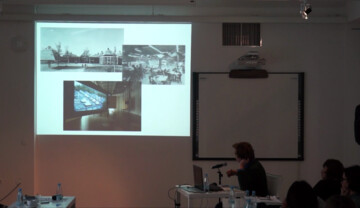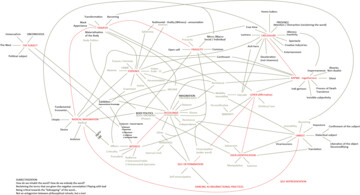I understand subjectivization to be the formation of a subject in relation to another. In this sense it is subjectivity in becoming, defined by what Felix Guattari saw as its ‘polyphonic’ nature, open to and formed by many different inputs and influences whether they be psychological, institutional, political or economic. Within this, and imbuing the notion of subjectivization with a sense of political agency, I propose the term self-determination.
Politically, self-determination speaks to the formation of a collective subjectivity outside the confines of dominant frameworks, whether that is the nation state or broader institutional structures. More specifically, self-determination describes a political, intellectual and emotional process whereby a space is created for a collective identity to be formed, thus allowing agency to be taken. The question of self-determination complicates accepted binaries of nationalism and internationalism, demanding that political subjects define their position and project their future in relation to a wider set of contexts and parameters. It means refusing the dominance of external forces, whether they are systems of governance or the market, actively engaging authority and power. It has underpinned colonial struggles as well as current debates for countries to break away from imperial masters, forging a new path for – and awareness of – themselves. Equally, it runs through present political demands across the globe as new collective subjectivities form as they articulate their grievances and desires. The appeal of self-determination is that it goes beyond resistance to propose new definitions and social or political formations, as yet unrealized or unforeseen.
Culturally, self-determination opens up an important space for how artists, practitioners and institutions define who they are, on what terms they operate and in relation to whom. Here, it seems to reignite the political potential of autonomy, a term that has ceded so much of its political bite to the modernist cause. It opens up the space for cultural agents to shape and articulate a collective identity and ideological framework within which to position themselves. Likewise, as institutions must reconsider their public role as states drastically redefine their relationship to museums and cultural organizations, the need for self-determination seems prescient. Yet, here we must speak of self-determination in relation to subjectivity: not for art to be self-determining, but artists; not museums, but those who work in them. Self-determination, wherever it appears, should thrive off its subjective impulses.



